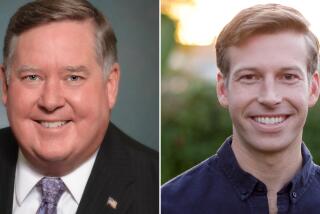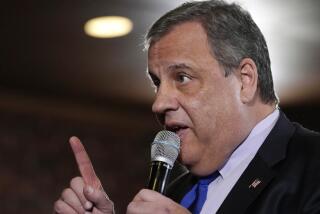Rollins Quits, Says Perot Wouldn’t Heed Advice : Politics: Strategist says headstrong Texan is sticking to a losing path. His departure sparks a crisis as other aides follow him out the door.
- Share via
DALLAS — Veteran Republican strategist Edward J. Rollins abruptly resigned Wednesday as a top presidential campaign adviser to independent Ross Perot, saying that his advice is being ignored by the strong-willed Texas independent.
Rollins also said pointedly that Perot’s present course will doom his as-yet undeclared candidacy. “I just don’t think continuing the way we are now is going to get us there.”
But a top Perot aide said it is clear that Perot has no intention of changing his strategy or tactics. “He’s never going to give up 100% control,” the aide said.
Campaign chief Tom Luce scrambled to persuade at least 10 key employees, all hired by Rollins, to stay. He met with the group Wednesday evening. But he failed in at least three cases: Charles Leonard, Rollins’ chief aide; Joe Canzeri, the main advance man; and Tony Marsh, a former Republican media consultant from Sacramento all quit after the meeting.
It was also unclear whether Hamilton Jordan, a longtime Democratic political strategist, would stay. Luce insisted that Jordan, who served as co-manager with Rollins, has agreed to remain as sole campaign manager.
A top Jordan assistant, Lisa Wells, said he would stay, but she was unable to say if he would be talking to the press any time soon. Asked how Jordan feels about the campaign’s recent turmoil, she said: “I don’t know.”
Jordan himself could not be reached for comment.
Late Wednesday night, Perot’s campaign announced that he has canceled scheduled appearances at rallies in St. Paul, Minn., on Friday and in Williamsburg, Va., on Saturday. No reasons were given, but the cancellations appear related to the departures of Canzeri and his staff, who were in charge of doing the advance work for such public rallies.
Only 45 days ago, the simultaneous hiring of Jordan and Rollins conferred upon Perot an instant aura of respectability among political professionals, who thought Perot had hired the necessary expertise to elevate his campaign from a volunteer-based effort into an organization that could rival the Republican and Democratic presidential campaigns.
But with Rollins’ resignation--and Jordan’s equally well-known dissatisfaction--the campaign has plunged into its worst crisis yet.
In an election year as extraordinary as 1992, the setbacks of one week have had a way of turning into the gains of the next, and political experts cautioned that Perot--with his deep resources and popular appeal--could still confound his rivals.
“There are going to be a lot more turns in the road between now and November,” said William J. Bennett, the former Bush Administration official who maintains close ties to the White House.
Stan Greenberg, a pollster for Democrat Bill Clinton, cautioned that surveys still show that Perot is well-positioned on the issue most important to voters: reviving the economy. In the Los Angeles Times Poll released last Sunday, for example, Perot held a substantial lead over Clinton and George Bush on the question of who could do the best job of promoting economic prosperity. “There’s still a lot of interest in this guy,” Greenberg said.
Still, Perot started slipping noticeably in the polls last month after a well-coordinated series of Republican attacks. And the latest Washington Post-ABC poll released Wednesday night had Clinton at 45%, Bush at 28% and Perot at 20%.
The slide in Perot’s support also comes after Perot said he would not appoint gays or lesbians to certain top government posts. Perot backed down only after gays and lesbians began disrupting his public appearances. And even then, the conciliatory statement he issued last week fell short with many activists, who wanted him to oppose the military’s exclusion of gays.
Last week, he offended many black Americans during a Nashville speech before the NAACP by referring to the delegates as “you people” and “your people.”
Among the advice offered by Rollins and Jordan that Perot ignored were the immediate airing of television ads, a formal declaration of candidacy and scheduling of certain, unspecified events and speeches.
But Perot has delayed declaring his candidacy and last week terminated the services of Hal Riney, a San Francisco advertising executive hired by Rollins. Riney produced a number of ads that Perot rejected. The ads included testimonials from Perot volunteers and a biographical sketch of the Texas billionaire.
Perot “just wanted to be a talking head” in the commercials, according to a source close to Riney. “Perot couldn’t understand why he couldn’t just stand in front of the camera and talk about what he believed in.”
Perot also was upset by the high cost of the ads, about $100,000 each. But the price had to do with the compressed deadline that the agency had to meet, the source said.
Rollins also was miffed that Perot rejected his suggestions to campaign by motorcade and to travel with a press plane, according to a senior campaign official.
Rollins, whose resignation was effective immediately, said he still supports Perot and will vote for the businessman if he qualifies for the ballot in Rollins’ home state, Virginia. “I continue to believe in the basic ideals of the movement and of the Perot candidacy, and I wish Mr. Perot well.”
One campaign source said Jordan and Rollins told Perot that he must declare his candidacy within two weeks or face the collapse of his independent bid for the White House.
“If he does not do something in the next two weeks, this whole effort is going to collapse,” the source said.
But Sharon Holman, Perot’s campaign press secretary, declared Wednesday: “Ross Perot has said he will declare when he is ready, and you are not going to force him to do it early.”
Another senior Perot adviser said of Rollins’ departure: “There were just irreconcilable differences on this. We’ve got this master politician (Rollins) who wants to do everything the conventional way, and the conventional way tends to go against Perot’s grain and undercuts his image.
“Image-building goes against the movement that got Perot where he is. . . . A lot of those things Rollins wanted to do were counter to what Perot is--like the Riney-type ads,” the aide said.
He added that the conflicts between Perot and his hired guns began from day one, explaining: “Rollins is high-powered and very good. He’s politically very good; we just couldn’t move at the speed and style that Ed liked . . . and so he kept running into obstacles.”
Rollins met with Luce and Morton H. Meyerson, another longtime Perot loyalist, over lunch Wednesday.
“We were not able to reach a mutual agreement on the course that this campaign ought to take,” Luce said at a hastily organized press conference. “Obviously we are disappointed. . . . But we’ve said all along . . . when they were brought in, we would run an unconventional campaign. . . . We just simply were unable to agree on how that ought to best be done. It’s that simple.”
Asked to elaborate on his recommendations to Perot, Rollins said: “The critical thing was to get on television. It’s very, very important when you don’t have a convention--how do you define your candidacy? And obviously the drop in the polls has indicated that my premise was probably correct.
“If we would had been on the air two weeks ago--like I would liked to have--we probably could have offset some of the damage.”
He said he and Jordan “were very much in sync about the need to get on television,” adding: “I would have (had Perot announce for President) sooner. The critical thing in this business is you’ve got to dominate the political arena.”
Rollins said he is leaving with no rancor. “Ross Perot and his people have treated me fairly. Let him run his kind of campaign. He’s paying for it.”
Reacting to news of Rollins’ resignation, a spokeswoman for the Bush campaign said the departure was yet another indication that the Perot campaign was “undergoing a meltdown.”
“Ed Rollins is just like everyone else in America when it comes to Perot,” press secretary Torie Clarke said. “The more he saw, the less he liked.”
Strategists from both the Republican and Democratic parties said their own research suggests that backing for the Texas independent could even drop into the teens by early next week.
So stunning were the new developments that Democratic and Republican operatives were already beginning to wonder aloud on Wednesday about whether Perot might choose simply not to enter the race.
But Perot’s campaign aides gamely brushed aside the speculation.
“I disagree with the premise,” said Elizabeth Maas, a Perot spokeswoman. “It’s still mid-July. It’s presumptuous to say that our supporters are fleeing. Remember, we haven’t even announced yet.”
Maas said she expects Perot to attract fresh supporters once he formally declares his candidacy.
Ironically, advisers to both Bush and Clinton said they would prefer--at least for now--that Perot not yet disappear from the campaign.
“If Perot gets boiled down to the low teens, all he’s keeping are our voters,” worried one Bush aide. And Bennett said he had no doubt that Bush would be “better off in a three-man race.”
Greenberg, Clinton’s pollster, said bluntly: “We are now in a mind-set that is comfortable with a three-man race.”
Rollins’ resignation and the accompanying turmoil did little to dampen the enthusiasm of Perot volunteers in California, however.
“We did not make this campaign to elect Ed Rollins; we made it to elect Ross Perot,” said Jan Meyers, a Perot leader in West Los Angeles.
Times staff writers Jack Nelson, Ronald Brownstein, Jack Cheevers and Bruce Horovitz also contributed to this story.
More to Read
Get the L.A. Times Politics newsletter
Deeply reported insights into legislation, politics and policy from Sacramento, Washington and beyond. In your inbox twice per week.
You may occasionally receive promotional content from the Los Angeles Times.










